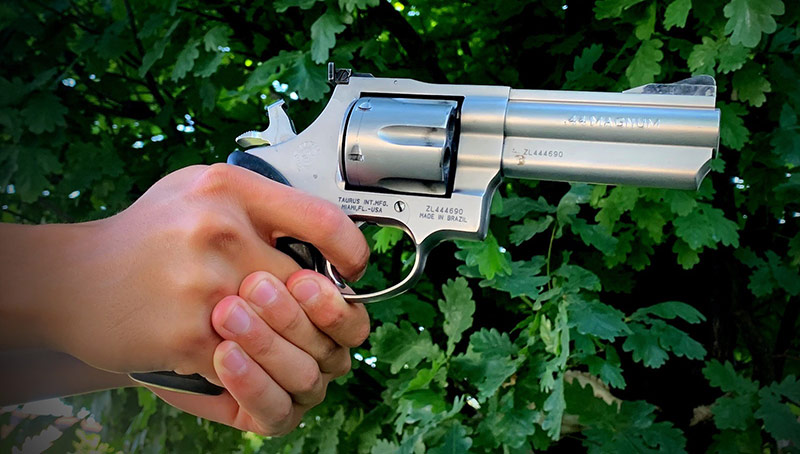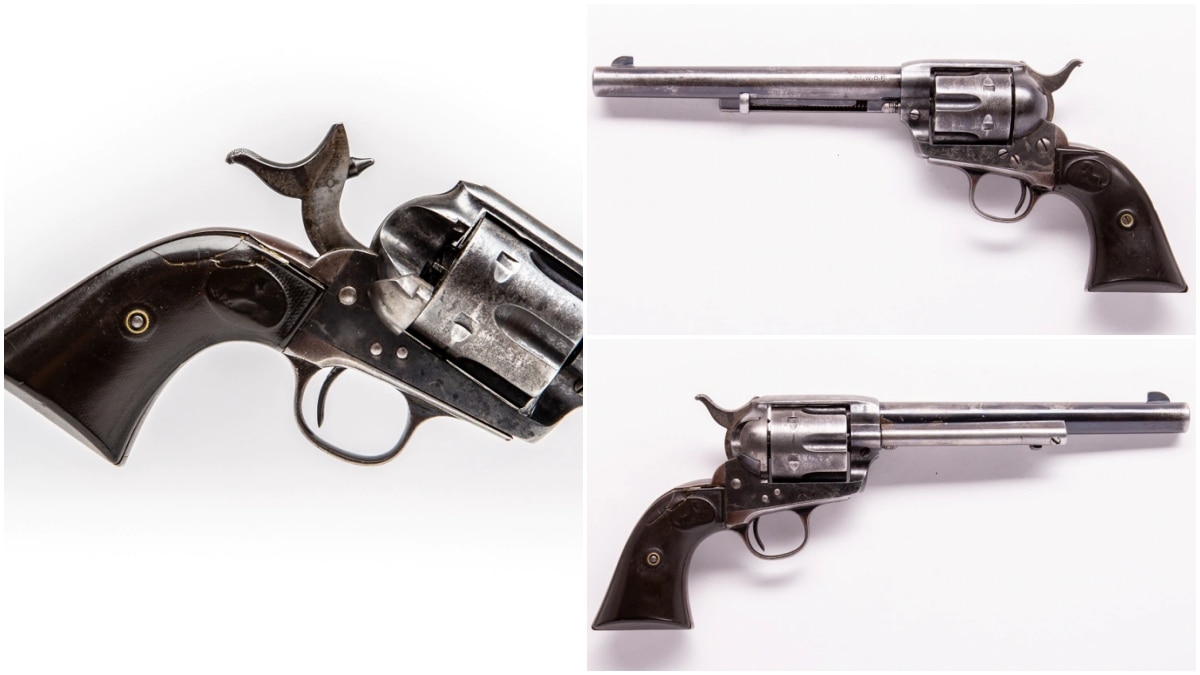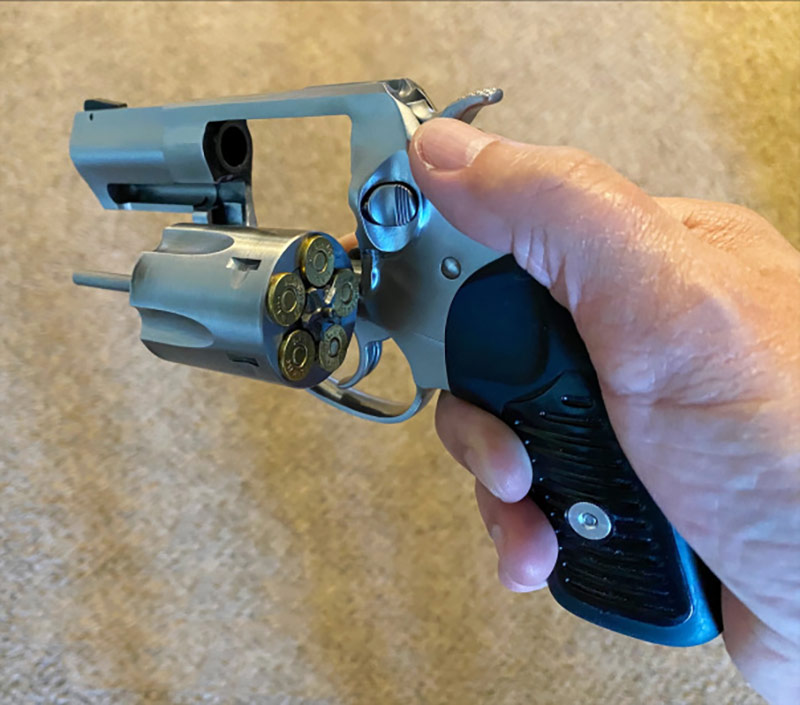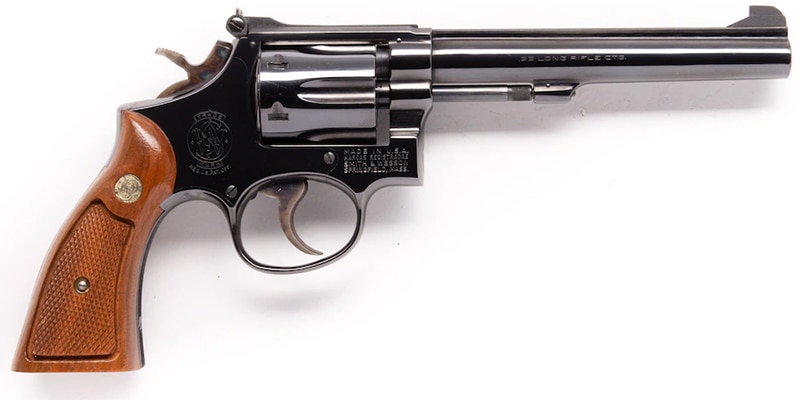
Why are revolvers still the go-to gun for some gun owners? (Photo: Jeff Wood/Guns.com)
Many years ago, Samuel Colt brought to market a product that changed the way people lived. As the adage goes, Colt “made men equal.” More than 180 years later, with a slew of firearms at consumers’ fingertips, how has the revolver kept its place in American defense?
What is a Revolver?
A revolver, or “wheel gun” as its commonly referred, is a firearm that uses a rotating cylinder with multiple chambers. The cylinder revolves, so the chambers fire individually. Each chamber aligns with the breach of the barrel, with the hammer cocked to ready the pistol for the next shot. It’s a fairly simple cycle, but in the early 19th century, it revolutionized the way people confronted dangerous threats.
Though the basic operation is the same, some revolvers have a fixed cylinder with a loading door that requires loading each chamber one at a time. Others use a cylinder that opens to the side of the frame, allowing access to all chambers at once. Some designs even break open, hinging the entire barrel/cylinder assembly forward and down, allowing access to the cylinder. The trigger and hammer engage with the cylinder rotation mechanism, ensuring that all are in line when the trigger is pulled.
Single-Action or Double
Most modern revolvers are double-action, that means they can be fired by either cocking the hammer manually, and pulling the trigger, or by simply pulling the trigger. A double-action revolver will mechanically cock the hammer and release it, while at the same time rotating the cylinder to the next chamber.
Single-action revolvers require that the hammer be cocked to the rear manually, the cylinder is mechanically rotated to a live chamber at the same time. The trigger sets during this same action and is ready to pull. Single-action revolvers were standard for many years, with many revolver fans still using them today.

This beautiful 1st Generation Colt Single Action Army dates to 1913. Chambered in .32-20, it is marked .32WCF on the 7.5-inch barrel. This is an important transitional model that designed with a stronger, modern frame to fire smokeless powder but still had many of the attributes of the earlier black powder SAAs including the placement of the serial numbers on the trigger guard and backstrap, one of the last in the series to have such features. (Photo: Richard Taylor/Guns.com)
Why Revolvers?
Despite what some would call ancient technology, modern gun enthusiasts still find the revolver design useful. Much like the very first Colts, they provide equalizing power against threats, make handy hunting companions, or provide all-day fun engaging targets.

Revolvers are easy to maintain and load, making them a great choice for some shooters. (Photo: Jeff Wood/Guns.com)
Some revolvers offer chambering for larger caliber cartridges, which makes them a great companion for situations that might require heavy-hitting shots. They also have the length of the cylinder for longer magnum cartridges and even some shotshells. This gives the revolver an edge for shooters in need of significant power in a small, concealable package.
Another advantage to the revolver platform is that these guns operate with direct input from the shooter, meaning the trigger finger cycles the next round into the firing position. Should you be in a sticky situation with a round that fails to fire, a simple press of the trigger finger brings the next round into the firing position. This prevents you from breaking your hold or aim. The simplicity of a revolver’s design also tends to make them less likely to malfunction.
Choosing the Right Revolver
We are spoiled with choices today with revolvers in nearly any caliber and frame size. There are lightweight options made from titanium or composite materials, as well as hammerless designs that won’t hang up on clothing when drawn. There are even models with extra cylinders that shoot different cartridges.

The Smith & Wesson Model 17 is a solid revolver. (Photo: Guns.com)
With so many options, it might be hard not to want at least one or two. When choosing a revolver, evaluate which models best fit your hand, purpose, and budget. There are plenty of new production pistols with the classic look of the original Colts, like the Cimarron Mod P in .45 LC. Even better, a moderate caliber like .45 LC won’t overwhelm with recoil or sink your wallet. If a more modern revolver is what you’re looking for, the Ruger GP-100 is available in a variety of calibers, and a stainless-steel frame. If affordable ammunition is on your radar, a 22-caliber revolver like the Smith & Wesson Model 17 is a great fit.
The post What IS a Revolver and Why Do Gun Owners Love Them? appeared first on Guns.com.
Powered by WPeMatico

